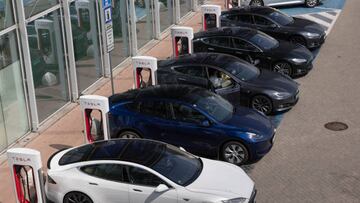When is California planning on banning the sale of new gas cars?
The state has approved a ban on gasoline cars starting in 2035 as part of a bid to cut motor vehicle emissions in the next two decades.


California, the nation’s most populous state, has approved a new policy which would ban the sale of new gasoline-powered vehicles by 2035.
The state is the country’s largest market for automobiles and lawmakers are eager to encourage residents to make the switch to electric-powered cars in the coming decades. Technological advances are making electric cars more feasible for motorists across the United States but in 2021 EVs represented just 3% of total car sales nationwide.
In 2020 Gov. Gavin Newsom directed regulators at the state level to look into the effects of a ban on electric cars to better understand its viability as a policy. The future ban is a result of a decision by the California Air Resources Board.
It is part of an ambitious plan to see California halve its total emissions from cars by the year 2040 and officials hope it sparks a shift across the country to transition to cleaner alternatives to gasoline. The state hopes to gradually ramp up EV production over the next 13 years, with the first target coming in 2026 when one-third of all vehicles sold will be zero-emission.
The measure still needs to gain federal approval before it can be signed into law. However given President Biden’s push towards a green economy it is thought that the California legislature will find little resistance.
.@SecretaryPete on California’s decision to ban sales of gas vehicles: “Federally, that’s not our approach. What we’re doing at the federal level is to incentives more fuel economy and other steps to help people afford electric vehicles.” https://t.co/9y2uh0y8G8 pic.twitter.com/GnAbG1PHec
— The Hill (@thehill) August 27, 2022
Are electric vehicles expensive?
Although there are many Americans who would like to swap their gas-guzzling machines for a greener alternative, the current price of the vehicles makes them prohibitively expensive for most.
The average price of an EV is currently $66,000. At a time when household budgets are particularly stretched it is unlikely that many will be able to make the change right now.
However manufacturers like Chevrolet and General Motors are planning to release more low-cost options in the near future and the White House is offering incentives for EV owners.
Just announced: We’ve signed agreements with two leading German automakers – Volkswagen and Mercedes. This will help us meet growing demand, both here at home and around the world, for electric vehicles. More here on what this means: https://t.co/JdgNFlTE4n
— Justin Trudeau (@JustinTrudeau) August 23, 2022
Related stories
President Biden’s recent Inflation Reduction Act includes a $7,500 tax credit for the purchase of a new electric car, although there are additional eligibility requirements. However while the technology is still in its relative infancy, there will be extra costs for the consumer to bear.
“That’s not going to fit in a lot of people’s monthly budgets at this point in time,” says Jessica Caldwell, executive director of Insights at Edmunds. “[Car manufacturers] have to introduce the more expensive, more costly, higher-margin vehicles first to make the money to start to finance some of the lower-cost vehicles.”